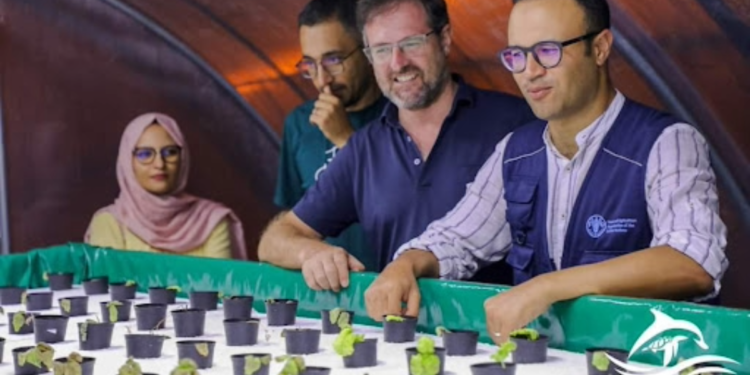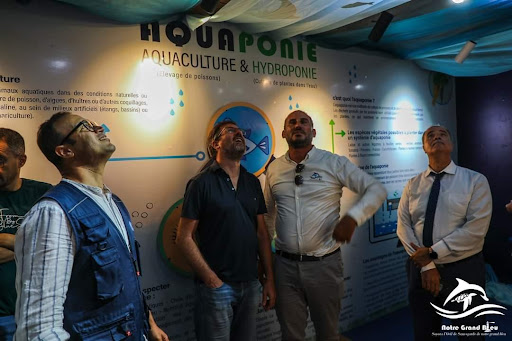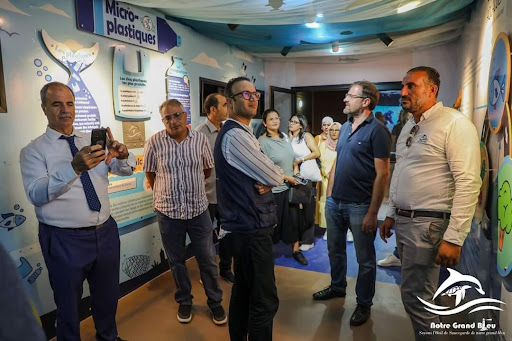GFCM and FAO support the Notre Grand Bleu Association to achieve leadership in the preservation of the Mediterranean Sea – Notre Grand Bleu is a non-governmental association founded in 2012, in Monastir, Tunisia. . Its mission is to preserve marine and coastal life in the Mediterranean and the human activities that depend on it, and to ensure a sustainable future for coastal areas, through:
- Promoting a culture of environmental awareness among Citizens and encourage them to safeguard natural resources, organize excursions, and internationally to raise awareness Of ecological problems and ways to conserve the environment;
- Establishing legal oversight of fisheries lows laws and their treatment;
- Exchange of experiences and twinning of local international associations with common interests;
- Carry out scientific studies and create a data bank for the collection and exchange of experiences on Posidonia and marine biodiversity.
The seas and oceans are an important vital source of life on our planet, play a crucial role in the balance and sustainability of the ecosystem. Among the important seas of the world, the Mediterranean comes to the fore, as it is considered a sea of great strategic importance for the surrounding region. To preserve this precious marine environment, the General Fisheries Commission for the Mediterranean (GFCM) and the Food and Agriculture Organization of the United Nations are supporting initiatives and projects that promote marine sustainability. In this context, a new aquaculture unit and a multipurpose smart learning room have been opened by Notre Grand Bleu association, with the aim of promoting learning and awareness in the fields of aquaculture, aquaponics and microplastic particles to promote aquaculture, improve fisheries management and Biodiversity Conservation. Through this support, Notre Grand Bleu Association was able to establish a new aquaponics unit and equip a smart multi-purpose educational room reflecting the organization’s commitment to promoting marine sustainability and promoting awareness of the importance of protecting the oceans and marine resources. By providing technical and scientific support, representatives from the organization can exchange knowledge and experience in the field of aquaculture and microplastic control.
Aquaponics Unit
Despite the existence of many problems, represented by the scarcity of water and the lack of suitable areas for agricultural activity, the quest to find alternatives to ensure the availability of food and achieve food security, the aquaponics unit is a wonderful system for integrating the biological environment, where it works to dispose of fish waste in a correct and natural way without entering into the complexities of the composition of nutrient solutions. This system is limited to feeding fish only, as it is the only source of plant nutrition, and this multi-purpose unit at azrugna el Kebir Association is a qualitative leap in the field of learning and awareness about the marine environment.
The Importance of aquaculture
Aquaculture is one of the most important sustainable methods of conserving marine resources, enhancing food security, meeting the growing food needs of the population and reducing pressure on wild fisheries. The new module can provide a space for exploration and discussion about the latest technologies in aquaculture in addition to enabling students, researchers and those interested in the subject to take advantage of the educational resources and practical interactions available in the educational room to learn the basics of aquaculture and its practical applications.
Control of microplastic particles
Microplastics pose a major environmental challenge in the Mediterranean Sea and the global oceans, where the Mediterranean region, which includes the most prominent global tourism destinations, is under enormous human pressure, and in particular accounts for a quarter of maritime traffic around the world. This semi-enclosed sea has reached saturation level, as the WWF warned that the Mediterranean waters contain between 5% and 10% of the total global plastic quantities.
In the depths, as on beaches or in the stomachs of turtles, plastic invades everywhere in the Mediterranean Sea, which is considered the most polluted among the seas of the world, and cleaning operations, no matter how intensified in curbing the disaster, will not work unless accompanied by a significant reduction in waste on land.. These particles affect marine life, move up the food chain and cause serious pollution. Directing light towards the problem of microplastic particles is one of the important challenges facing the aquatic environment. Having an educational room dedicated to this topic, everyone can learn about the impact of microplastic particles on the aquatic environment and living organisms. The new module will provide a deeper understanding of this problem and introduce students and researchers to the necessary measures to address it, such as reducing the use of plastic, recycling it properly, developing sustainable environmental solutions for the disposal of plastic waste and reducing negative impacts on the marine environment.
By investing in aquaculture and controlling microplastic particles, we can achieve an ecological balance in the Mediterranean and preserve an important vital source of life on our planet. Through our cooperation and joint efforts, we can ensure the sustainability of this wonderful sea and leave it as a valuable heritage for future generations.
GFCM and FAO support the Notre Grand Bleu Association to achieve leadership in the preservation of the Mediterranean Sea










